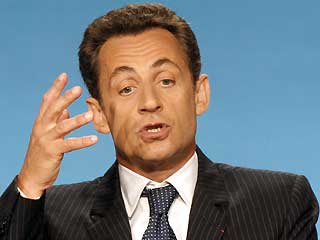ROUNDUP: Sarkozy demands common European stance on regulation
 Paris - French President Nicolas Sarkozy demanded late Thursday that the European Union adopt a common position to reform the capitalist system.
Paris - French President Nicolas Sarkozy demanded late Thursday that the European Union adopt a common position to reform the capitalist system.
During a 90-minute appearance on national television to discuss the economic crisis, Sarkozy also criticized the European Union for passivity in the face of the crisis.
"It is not possible that, in such a situation, Europe does not take the initiative," Sarkozy said, indirectly criticizing the Czech presidency and the European Commission.
He went on to say that he wanted Europe to have a common position at the April 2 meeting of the G20 nations in London on the future regulatory measures to be imposed on Western financial institutions.
Sarkozy said that all financial institutions must be regulated in the future, particularly hedge funds, tax havens and rating agencies.
"France wants this to be a common European position," Sarkozy said.
Speaking one week after a general strike and nationwide demonstrations to protest his government's economic policies, Sarkozy sought to defend his economic stimulus plan and his ambitious economic reform programme.
The success of the January 29 strike and demonstrations, in which up to two and a half million people took to the streets, added urgency to his performance, which took the form of an interview with four French journalists.
Trade union leaders had threatened to call for more strikes and street demonstrations unless Sarkozy abandoned his economic and public sector reforms and did more to protect jobs and increase purchasing power.
But in the matter of the reforms, the French president remained firm. "Are the reforms still on? The answer is yes," he said. "It is the only way for France to emerge stronger from the crisis than it was when (the crisis) started."
Sarkozy said he was considering new measures to increase the purchasing power of the French consumers, including eliminating income taxes for lower-middle-class families and increasing state family subsidies.
He said he would make new proposals during a meeting with trade union leaders and entrepreneurs on February 18. One of those proposals, which is certain to stir controversy, would be to force employers to more equitably distribute profits within their firms.
He also said he was considering abolishing local corporate taxes for all French industries in 2010.
The widely anticipated appearance was crucial for Sarkozy's credibility in the face of the worsening economy and the growing protest movement.
Surveys show that the popularity he had gained through his energetic performance as president of the European Union in the second half of 2008 is now being eroded by rising unemployment and other gloomy economic news.
In addition, according to a recent poll, nearly two out of three French adults believe the government's measures to fight the economic crisis are not working. (dpa)